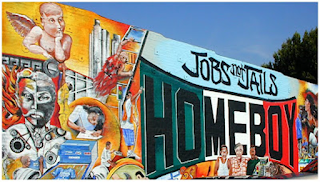Fr. Boyle’s book “Tattoos on the Heart” recounts two decades of working with and in this community. He says, “the church is nestled in the middle of two large public-housing projects, Pico Gardens and Aliso Village. Together they comprise the largest grouping of public housing west of the Mississippi.” It’s no Pac Heights.
In just two weeks time, I learned about gangs, why young people join, why they stay and why they leave. I also learned about the senseless killing and violence, the cycle of poverty and despair and the importance of a good father for so many young men. I learned many life lessons, but what surprised me the most was contradictory.
In just two weeks time, I learned about gangs, why young people join, why they stay and why they leave. I also learned about the senseless killing and violence, the cycle of poverty and despair and the importance of a good father for so many young men. I learned many life lessons, but what surprised me the most was contradictory.
Good, bad or otherwise, people know one another’s families—their abuelas and tios, “homies” and “homegirls” know who lives where and who belongs to whom. The community has banded together in many ways. Yes, out of necessity but also in prayerful and powerful support. Basta ya! Enough already.
What a contrast Boyle Heights was to my home on Fillmore and Washington streets—the very heart of Pac Heights. Homes around me sell for over a million dollars. The colors of the buildings are cool, soft pastels accented by gingerbread woodwork and designer landscapes. The streets are cleaned every morning at 6:00 a.m. Parking is a premium. Safety is rarely if ever an issue.
As much as I love my neighborhood, I realized a sad truth when I returned. I can count on one hand how many of my neighbors I know. I live in a building with five other apartment units. I know the names of no one. To a large degree, I am anonymous and so are most of the people I live beside. What a contrast. What a striking contradiction.
But somehow, someway our humanity always breaks through. I think of these tiny flowers that break through the concrete of the sidewalk. They say to me that beauty is a necessity in this life. It finds us, even in unlikely places, amid unlikely circumstances.
What a contrast Boyle Heights was to my home on Fillmore and Washington streets—the very heart of Pac Heights. Homes around me sell for over a million dollars. The colors of the buildings are cool, soft pastels accented by gingerbread woodwork and designer landscapes. The streets are cleaned every morning at 6:00 a.m. Parking is a premium. Safety is rarely if ever an issue.
But somehow, someway our humanity always breaks through. I think of these tiny flowers that break through the concrete of the sidewalk. They say to me that beauty is a necessity in this life. It finds us, even in unlikely places, amid unlikely circumstances.
As Vicki was describing this loyal St. Ignatius and Georgetown alum, I realized I actually knew whom she was talking about. I never knew his name, but at least once a week, if not more, I saw a middle-aged man run down Fillmore Street. This man was loyal to his Hoyas; he always ran with a classic Georgetown t-shirt. Just recently I noticed he switched from a long sleeved navy Georgetown shirt to a fresh white Georgetown tee. He too opted for the classic script.
As a fellow runner, I would look at him in wonder. He often ran late at night, he ran in the rain, he ran in the “oh so rare” heat, and he always ran at a good clip, even if he did have the downhill. He too ran without headphones, I could see the way running cleared his mind and stilled his conscience.
 I didn’t’ know him…but I did. He was a member of this community and his presence will be missed. His quirky humanity was expressed in something I could relate to, something I valued, it was a passion we shared. I think of Fillmore Street without this warm soul pounding the pavement and something is missing.
I didn’t’ know him…but I did. He was a member of this community and his presence will be missed. His quirky humanity was expressed in something I could relate to, something I valued, it was a passion we shared. I think of Fillmore Street without this warm soul pounding the pavement and something is missing.
In the same way that Boyle Heights knows loss, unfortunately all too well, Pacific Heights has experienced a loss. Don Casper will be missed. And the contradiction in this is that although our communities seem different, we are the same. The presence of one person can and does make a difference. Our humanity always breaks through.
Photo Credits
Don Casper
Homeboy Industries
Father G
Flower breaks through
Running at Sunset





another wonderful article Anne. Although I did not know Don, my sister did, and other good friends. He will indeed be missed by many in this community and all the associations he was involved with.
ReplyDelete